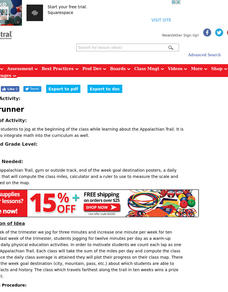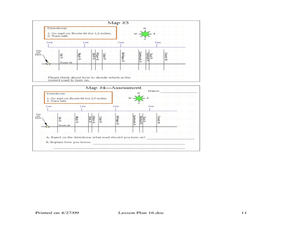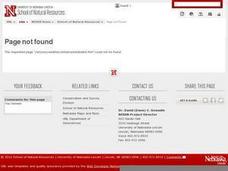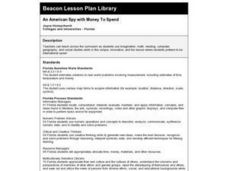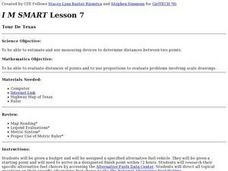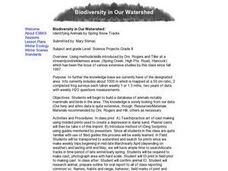Curated OER
Route Reconstruction
Learners trace sailing route of Spanish and Portuguese exploration ships. They calculate and compare distances that different explorers traveled. Students calculate how long it would take to travel an explorer's route using different...
Curated OER
A Capital Idea
Students write a description of the spatial organization of the former and present location of New Hampshire's state capital. They analyze maps, participate in a class discussion, and calculate the distance of Concord from the borders...
Curated OER
Peru's Earthquake
Students identify the patterns of earthquakes by mapping USGS data and comparing it to mapped tectonic plates. They discover the relationship between earthquakes and the moving plates of the Earth's crust.
Curated OER
Researching the World's Oceans
Learners research and compare important features of the oceans based on current data. They examine the globe or map, determine the major oceans of the world, and record their names on the data sheet.
Curated OER
Ecosystems
Students work together to identify the characteristics of their local ecosystem and another one nearby. In groups, they use a Venn Diagram to compare and contrast the two. They use this information to create a collage of both...
Curated OER
Ridgerunner
Students jog for three minutes at the beginning of the class, increasing one minute per week for ten weeks. They count each lap as one mile on the Appalachian Trail, computing the class average and plotting their progress on a class map.
Curated OER
Earthquakes and Seismic Waves
Students investigate the Richter scale and seismology in a teacher-led lab in which they are introduced to the concept of seismic waves and epicenter location. They further investigate the inner workings of a seismograph and practice...
Curated OER
Regional Economics in the United States
Students describe and provide examples of the primary factors
behind the regional pattern of economic activity in the United States. They create maps showing regional economics patterns
in the US and examine those patterns in comparison...
Curated OER
Patchwork of the Planet
Young scholars are taught how satellite images can be joined to make a picture mosaic. They use actual satellite images to make satellite mosaics regions of the United States. Students use a camera to photograph portions of a globe in...
Curated OER
Where Should You Turn?
Fourth graders complete activities to study decimal numbers. In this decimal numbers instructional activity, 4th graders study decimal numbers to express numbers less than one and intervals. Students complete map and location activities...
Curated OER
Warm up to the Gulf Stream
Learners find out the temperature difference between the Gulf Stream and the surrounding water. They locate the Gulf Stream on the infrared image of the eastern seaboard of the US.
Curated OER
Activities to Enhance STEDII Data
Students develop an understanding of related weather processes such as wind, cloud cover, and temperature using STEDII data and instrumentation. In addition, they integrate mathematical calculations to produce a forecast map.
Curated OER
Lewis and Clark
Fourth graders research the Lewis and Clark expedition and the Corps of Discovery. They explore a variety of websites and complete a WebQuest, analyze maps, and answer comprehension questions. Students also write journal entries and...
Curated OER
How Does Your Garden Grow?
Students create a design for a school garden. In this garden design lesson, students analyze what plants grow best in their school's climate and work in teams to design a garden. Students measure the existing space, determine the...
Curated OER
An American Spy with Money To Spend
Sixth graders use their imagination, math, reading, computer, geography, and social studies skills in this unique, innovative, and fun lesson where students pretend to be international spies!
Curated OER
Comparing Amount of Rainfall in Different Geographical Areas
Learners construct rain gauges and use them to log rainfall in their school zone, local city, and region and then compare and discuss them by plotting this information.
Curated OER
Language Families
Fourth graders identify and locate the three language families of North Carolina. They calculate the physical area covered by each language family and label them on a map.
Curated OER
The Arctic and Taiga Ecozone of Canada
Students discover the differences in the Arctic and Taiga regions of Canada. They identify physical and human characteristics of both region. They also practice using an atlas.
Curated OER
That Was Then
Students compare and contrast their community in the past and today. Using primary sources, they develop their own history of their community. Individually, they create maps of the local area and complete sketches of local gravestones.
Curated OER
The Path of Pollution
Students conduct a brainstorming exercise that asks them to list all the ideas about air pollution that can be recalled. The ideas are recorded on a chart that the teacher has prepared. The lesson plan contains sufficient background...
Curated OER
The Arctic and Taiga Ecozone of Canada
Young scholars examine the various sub-regions of the Arctic and Taiga zones in Canada. Using the online Canadian Atlas, they locate and describe the characteristics of each zone. They organize their information into a chart and share...
Curated OER
Math: A Geometric Neighborhood
Young scholars, as a final project, draw a picture of their ideal neighborhood on a sunny day. In addition to the sun, their drawings include homes, trees, streets, and selected objects. Each object in their drawing has a written...
Curated OER
Tour De Texas
Learners are given a budget and an alternative-fuel vehicle. Using a map of Texas, they are given a starting point and determine how to arrive at their destination within 72 hours. They use the internet to research the alternative fuel...
Curated OER
Biodiversity in Our Watershed
Eighth graders create a database of animals and birds in the area in which they live. They use molded prints to make a cast of an imprint from a specific animal. They identify and research animals and prepare an outline for an oral...







